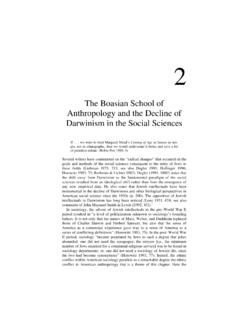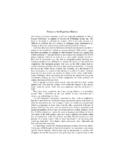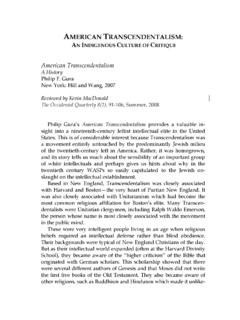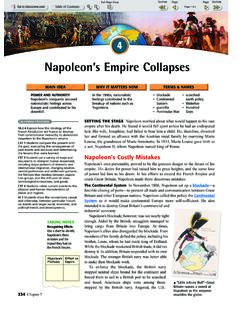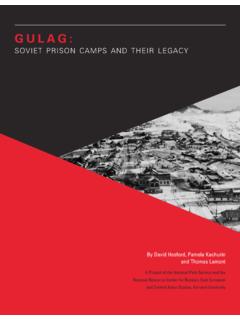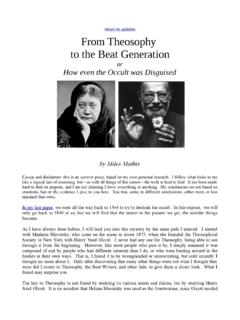Transcription of S WILLING EXECUTIONERS H E USSR - Kevin B. MacDonald
1 STALIN S WILLING EXECUTIONERS JEWS AS A HOSTILE ELITE IN THE USSRThe Jewish Century Yuri Slezkine Princeton, NJ: Princeton University Press, 2004$ (cloth)x + 438 pagesReviewed by Kevin MacDonaldA persistent theme among critics of Jews particularly those on the pre-World War II right has been that the Bolshevik revolution was a Jewish revolution and that the Soviet Union was dominated by Jews. This theme appears in a wide range of writings, from Henry Ford s International Jew, to published statements by a long list of British, French, and American political figures in the 1920s (Winston Churchill, Woodrow Wilson, and David Lloyd George), and, in its most extreme form, by Adolf Hitler, who wrote:Now begins the last great revolution.
2 By wresting political power for himself, the Jew casts off the few remaining shreds of disguise he still wears. The democratic plebeian Jew turns into the blood Jew and the tyrant of peoples. In a few years he will try to exterminate the national pillars of intelligence and, by robbing the peoples of their natural spiritual leadership, will make them ripe for the slavish lot of a permanent subjugation. The most terrible example of this is This long tradition stands in sharp contradiction to the official view, promulgated by Jewish organizations and almost all contemporary historians, that Jews played no special role in Bolshevism and indeed were specifically victimized by it.
3 Yuri Slezkine s book provides a much needed resolution to these opposing perspectives. It is an intellectual tour de force, alternately muddled and brilliant, courageous and AND MERCURIANS One of the muddled elements, apparent at the beginning and present throughout The Jewish Century, is Slezkine s claim that the peoples of the world can be classified into two groups. The successful peoples of the modern world, 66 Vol. 5, No. 3 The Occidental Quarterlytermed Mercurians, are urban, mobile, literate, articulate, and intellectually sophisticated.
4 Distinguished by their ability to manipulate symbols, they pursue wealth for the sake of learning, learning for the sake of wealth, and both wealth and learning for their own sake (p. 1). Since Slezkine sees Jews as the quintessential Mercurians, he regards modernization as essentially a process of everyone becoming Jewish. His second group, which he calls Apollonians, is rooted in the land and in traditional agrarian cultures, and prizes physical strength and warrior conceptualizes Mercurianism as a worldview, and therefore a matter of psychological choice, rather than as a set of psychological mecha-nisms, the most important of which is general As a result of this false premise, he exaggerates the similarity among Mercurians, underestimates the power of ethnocentrism as a unifying factor in Jewish history, and fails to understand the roots of Western social and economic institutions.
5 Slezkine views Judaism as one of many Mercurian cultures peoples that dwell alone in Diasporas, living among strangers and often acting as economic middlemen: the Overseas Chinese, Indians, and Lebanese, and the Gypsies and Irish Travelers. Their common denominator, in Slezkine s view (and mine3), is their status as strangers to the people they live among sojourners who, above all else, do not intermarry or socialize with the locals. Their interactions with the local Apollonians involve mutual hostility, suspicion and contempt (p. 20) and a sense of superiority. Moreover, a common host stereotype of the Mercurians is that they are devious, acquisitive, greedy, crafty, pushy, and crude (p.)
6 23). The Mercurians possess greater kin solidarity and internal cohesion than the people they live among; they are characterized by extended families and patriarchal social organization. So far, so good, although I would stress that the family organization of such groups derives more from the long-term adaptation to the culture areas they originate from than from an adaptation to the nomadic, middleman But Slezkine maintains that Mercurians are above all smarter than the people they live among: They are said to possess cunning intelligence, but it is surely a mistake to consider such disparate groups as Jews (or the Overseas Chinese) and Gypsies (or the Irish Travelers) as having in common a particular set of intellectual traits.
7 After all, the Jews, as Slezkine shows, have repeatedly become an academic, intellectual, cultural, and economic elite in Western societies, while Gypsies have tended toward illiteracy and are at best an economically marginal group. Slezkine imagines that the Gypsies and literate middleman groups like the Jews or Overseas Chinese differ not in intelligence but only in whether they express their intelligence through literacy or an oral culture: Businessmen, diplomats, doctors, and psychotherapists are literate peddlers, heralds, healers, and fortune-tellers (p. 29) a formulation that will not stand the test of current psychometric data.
8 In fact, the general patterns of Gypsies are the Fall 2005 / MacDonald 67opposite of Jews: a low-investment, low-IQ reproductive style characterized by higher fertility, earlier onset of sexual behavior and reproduction, more unstable pair bonds, higher rate of single parenting, shorter interval of birth spacing, higher infant mortality rate, and higher rate of survival of low birth weight Intelligence, for Slezkine, is a lifestyle choice, rather than a set of brain processes underlying information processing and strongly influenced by genetic variation.
9 As we shall see, this formulation is very useful to Slezkine as he constructs his argument later in the his attempt to paint with a very broad brush, Slezkine also ignores other real differences among the Mercurians, most notably, I would argue, the aggressiveness of the Jews compared to the relative passivity of the Overseas Chinese. Both the Jews and the Overseas Chinese are highly intel-ligent and entrepreneurial, but the Overseas Chinese have not formed a hostile cultural elite in Southeast Asian countries, where they have chiefly settled, and have not been concentrated in media ownership or in the construction of culture.
10 We do not read of Chinese cultural movements disseminated in the major universities and media outlets that subject the traditional culture of Southeast Asians and anti-Chinese sentiment to radical critique, or of Chinese organizations campaigning for the removal of native cultural and religious symbols from public Slezkine paints Jews as deeply involved in the construction of culture and in the politics of the host societies, but the role of the Chinese was quite different. The following passage describing the political attitudes of the Overseas Chinese in Thailand could never have applied to Jews in Western societies since the Enlightenment:But few seem to know or indeed to care about the restrictions on citizenship, nationality rights, and political activities in general, nor are these restrictions given much publicity in the Chinese press.
